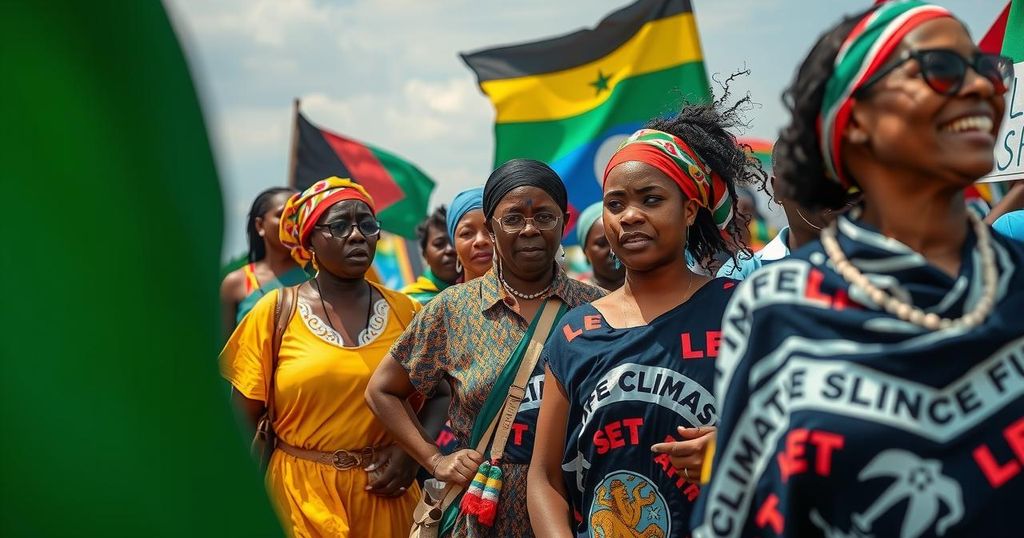Senegalese Women’s March for Climate Justice: A Call to Action Against Polluting Nations
Senegalese women activists marched in Dakar to demand climate justice and action from polluting countries ahead of the COP29 conference. They highlighted urgent issues such as severe flooding impacting their communities and called for accountability from nations responsible for high greenhouse gas emissions. The march is part of a larger movement emphasizing the need for justice and recognition of Africa’s minimal contribution to global emissions amid considerable environmental suffering.
On Saturday, a group of approximately 50 Senegalese women climate activists marched through the streets of Dakar, advocating for climate justice in anticipation of the upcoming 2024 UN Climate Change Conference (COP29) set to occur on November 11. This annual march, which has been held since 2021, has taken on heightened significance this year as participants voiced their frustrations against major contributing countries to climate change, urging them to reduce greenhouse gas emissions. Chanting slogans such as “Down with capitalism! Down with polluting countries!” the activists marched through the Medina district, brandishing banners that called for the safeguarding of Senegal’s natural resources and promoting a decarbonized future. Cheikh Niange Faye, a former tour guide from Senegal’s Thiès region, articulated the collective sentiment stating, “It’s been four years that we’ve been marching, and nothing’s changed. They’re spending billions to do their conferences, but they owe us billions in compensation.” The urgency of their call to action is underscored by the recent catastrophic flooding that has impacted Senegal and the wider Sahel region, leaving tens of thousands affected and damaging over 1,000 hectares of crops, according to government reports. Activists assert that the nations most responsible for greenhouse gas emissions bear a moral obligation to compensate Africa for the adverse effects brought by climate change, given that the continent contributes only approximately 3.8% of global emissions, as reported by the Carbon Disclosure Project. Khady Camara, the main organizer of the march, emphasized the necessity for polluting nations to honor the commitments of the Paris Agreement during the lead-up to COP29. Another activist, Khady Faye, expressed the plight of communities near the Saloum Delta, which has suffered immensely from coastal erosion and the recent commencement of oil drilling in nearby waters by Woodside Energy. She implored policymakers to consider the devastating impacts on local populations, asserting, “Think about the suffering of these communities, think about the suffering of these women.” As the climate crisis deepens, the voices of these Senegalese women not only highlight the urgent need for action but also underscore the broader struggle for justice against the backdrop of environmental degradation that disproportionately affects marginalized communities.
The Senegalese women’s march for climate justice is part of a growing global movement advocating for immediate and accountable action against the adverse effects of climate change. This march, which has been organized annually since 2021, underscores the frustrations of communities in Senegal that are experiencing the direct consequences of climate change, such as unprecedented flooding, despite their relatively low contribution to global emissions. As African countries continue to grapple with the aftermath of climate-related disasters, activists are calling on industrialized nations—those historically responsible for significant greenhouse gas emissions—to take responsibility and provide reparations. This backdrop sets the stage for the high-stakes discussions anticipated at the COP29 conference, where combatting climate change and addressing environmental injustices will be at the forefront of the agenda.
In conclusion, the march by Senegalese women in Dakar epitomizes a powerful voice in the global climate justice movement, demanding accountability from nations that contribute to environmental degradation while advocating for sustainable practices that protect vulnerable communities. As the climate crisis intensifies, particularly in regions like the Sahel, the urgent call for change resonates louder, urging policymakers to recognize their responsibilities towards the most affected populations. The organizers and participants reaffirm the necessity for action, reinforcing their determination to continue advocating for a more equitable and environmentally sound future.
Original Source: abcnews.go.com




Post Comment